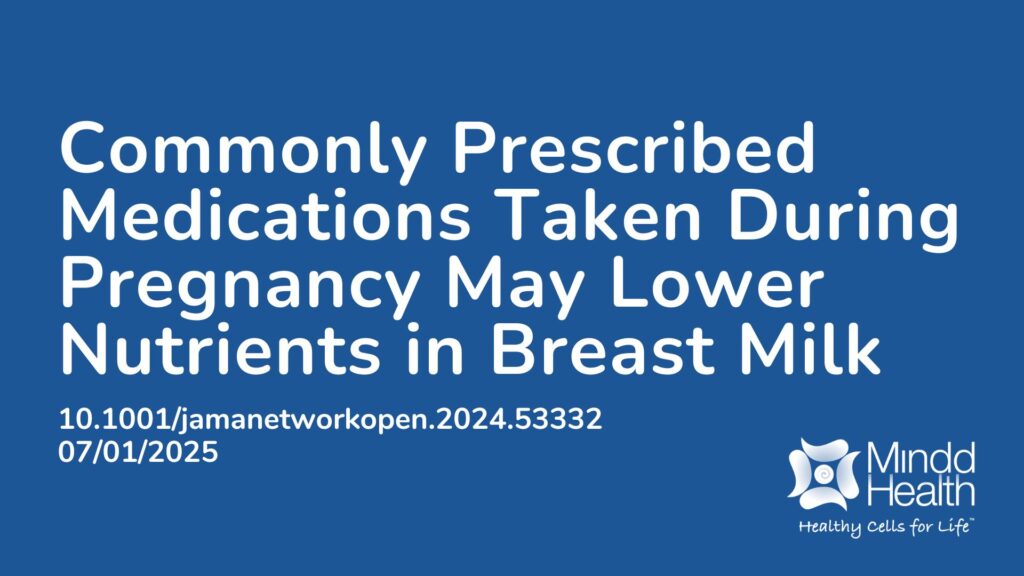Summary:
Researchers investigated how medications taken by breastfeeding mothers might affect the nutrients in their breast milk. The study compared protein, fat, carbohydrate, and energy levels in milk from mothers taking long-term medications to milk from healthy mothers and mothers with similar health conditions who weren’t on medication. Breast milk samples were collected between 2014 and 2024 in the US and Canada. A total of 384 samples were analyzed, including those from mothers taking medications like SSRIs (antidepressants), monoclonal antibodies, steroids, and other anti-inflammatory drugs, as well as from healthy mothers and disease-matched controls. The analysis measured macronutrients and energy while accounting for factors like maternal and infant age, feeding habits, and lifestyle influences. The findings showed that protein levels were 15-21% lower in milk from mothers on certain medications, such as SSRIs and steroids, compared to healthy mothers. Fat and energy levels were 10-22% lower in milk from mothers taking anti-inflammatory drugs compared to both healthy and disease-matched mothers. These differences were statistically significant for protein in SSRIs and steroids and for fat in anti-inflammatory drugs compared to disease-matched controls. The study therefore suggested that some medications may reduce protein and fat levels in breast milk, which could impact infant health.
Abstract:
Importance The association between maternal medications and the macronutrient composition of human milk has not been studied. Objective To compare macronutrient levels in milk samples from mothers treated with long-term medications with samples from untreated healthy and disease-matched control mothers (DMCs). Design, Setting, and Participants A cross-sectional study using samples collected between October 2014 and January 2024 from breastfeeding mothers in the US and Canada invited to participate to the Mommy’s Milk Human Milk Research Biorepository at the University of California, San Diego. Of 3974 samples from unique individuals in the biorepository, 310 were from mothers treated with 1 of 4 categories of medications, 151 from DMCs with the same underlying disorders, and 73 from healthy untreated mothers, frequency matched on infant age and sex. Of these, 150 were excluded because they had more than 1 medication exposure or were outliers. Data were analyzed from March to June 2024. Exposures Continuous treatment with selective serotonin reuptake inhibitors (SSRIs), monoclonal antibodies (MABs), systemic steroids, and other anti-inflammatory drugs (ADs) in the 14 days before milk sample collection. Main Outcomes and Measures Levels of protein, fat, carbohydrate, and total energy were measured with SpectraStar 2400 near infrared analyzer and compared across groups with analysis of covariance adjusted for infant and maternal age, parity, maternal body mass index, infant sex, exclusive breastfeeding, feeding frequency, collection time, maternal cannabis use, and occupation. Results A total of 384 samples were collected; 194 infants (50.5%) were female; the mean (SD) age of the maternal cohort was 33.5 (4.4) years, and infant age at collection was 6.6 (5.4) months. Mean (SD) protein levels were 15% to 21% lower in samples from exposed mothers (0.92 [0.56] g/100 mL for 63 SSRIs, 0.85 [0.51] g/100 mL for 63 MABs, 0.88 [0.37] g/100 mL for 33 steroids, and 0.85 [0.54] g/100 mL for 20 other ADs) compared with 64 samples from healthy mothers (1.08 [0.50] g/100 mL). Adjusted differences were significant for SSRIs and steroids (F1, 91 = 4.32; P = .04 and F1,59 = 5.00, P = 0.03, respectively). Mean (SD) fat and energy were 10% to 22% lower in samples from mothers with other ADs (3.40 [1.21] g/100 mL for fat and 69.56 [15.35] kcal/100 mL for energy) than from healthy (3.85 [1.66] g/100 mL for fat and 77.16 [22.08] kcal/100 mL for energy) and DMC (4.38 [1.90] g/100 mL for fat and 80.60 [24.70] kcal/100 mL for energy) mothers. Adjusted differences were only significant for fat compared with DMC (F1,88 = 6.22; P = .01). Conclusions and Relevance In this cross-sectional study, some maternal medications were associated with lower levels of protein and fat in milk, which could impose health risks for breastfed infants. Other factors that could influence macronutrient levels need to be clarified before the clinical implications of these findings can be confirmed.
Article Publication Date: 07/01/2025
DOI: 10.1001/jamanetworkopen.2024.53332



